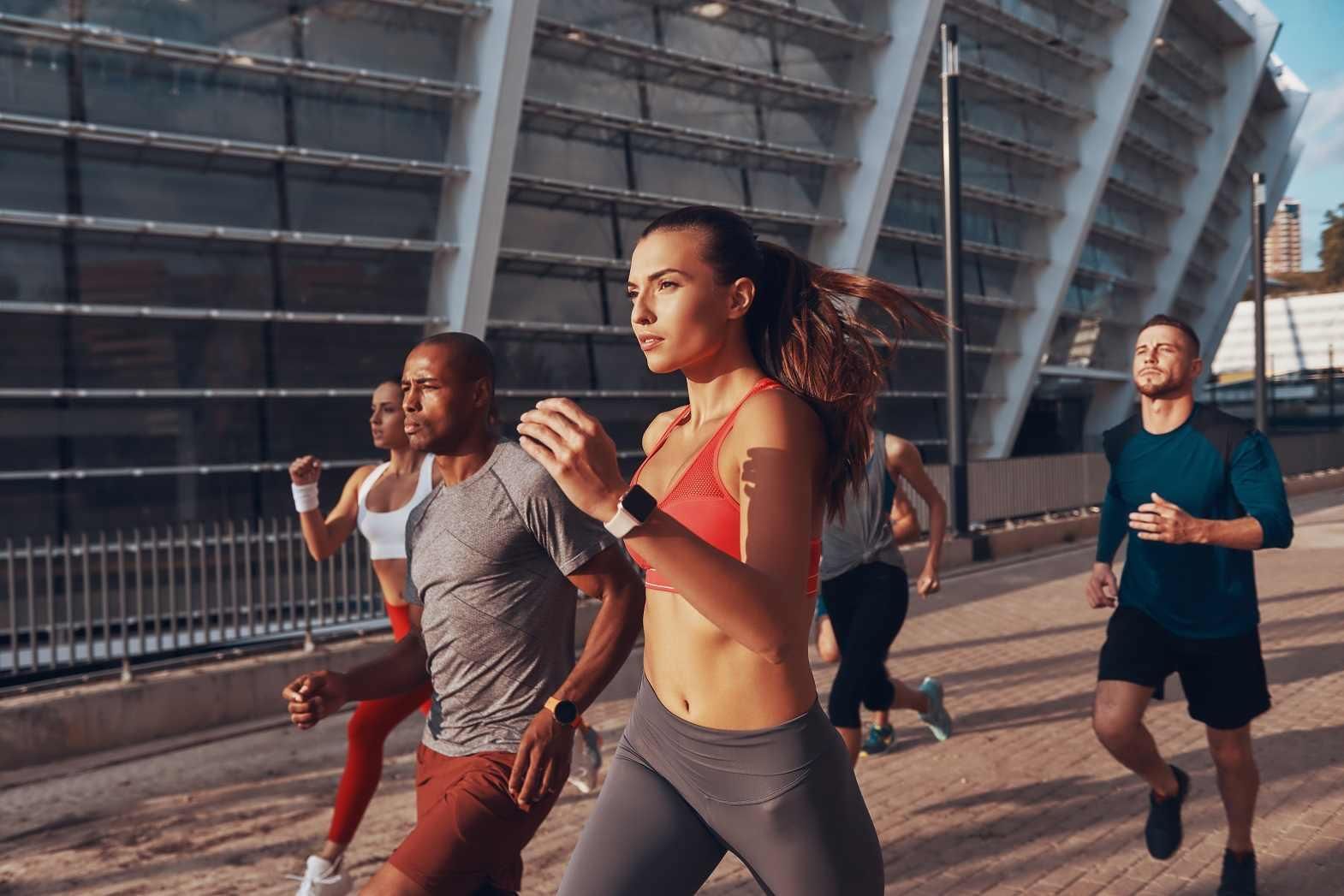Sports have been an integral part of human life since ancient times when the games were staged in Olympia, Greece from 776 BC through 393 AD. While it took another 1,500+ years for Olympics to return on global stage, various sporting games and events continued to demonstrate their popularity in various regions of the world during this period. In the modern age, sports have become more professional, and demand for sporting goods encompassing accessories, equipment, and apparel along with related technology has grown by leaps and bounds. The worldwide popularity of sports like football, cricket, tennis, basketball and other athletic games has only added to the growing demand of sporting goods. In more recent decades, the penchant for healthy lifestyle has added new dimensions to sports market. Throughout its journey, the sporting goods have seen many new innovations, product categories and consumer segments emerging. With passing time each one of them has evolved into a niche market in itself. This feature talks about the global trends in sportswear.
Global Sportswear Market
The global sportswear market is currently estimated at around $200 billion, which is projected to cross $350 billion by 2032. At present, North America leads with 45 per cent of global sportswear market revenues. However, during the next decade, Asia- Pacific region is expected to grow at the fastest CAGR. Emerging markets in Asia-Pacific, the Middle East and Latin America are expected to drive the growth of the sportswear market as they will see the strongest online growth in the broader apparel market, further enabling the growth in the sports apparel market. Brands like Nike and Adidas are likely to continue to lead in online offerings.
Market Dynamics
In many countries across the world, the governments have introduced initiatives to encourage participation in sports and increased investments to strengthen relationships between communities and sports organisations, benefitting the overall sportswear category in the process.
The demand for fashionable and comfortable sportswear is increasing due to an increasing number of people suffering from work-related health problems including stress and obesity, who are shifting to any type of sport or fitness activity to maintain a healthy lifestyle. The segment is undergoing exponential growth, showing its high profit potential and consumer appeal. Since 2010, the sportswear market has been growing through its sub-segments of activewear and athleisurewear as both can be worn during exercise and for general day-to-day wear providing comfort, and physical as well as psychological benefits. Their designing to serve both purpose is not that easy though. Despite the challenge of designing, the category is in great demand especially in post-pandemic era. The world had slowed down during pandemic and when the markets revived speedily the brands started churning out new styles to keep up with the changing needs of the consumers, resulting in over-production and waste unfortunately. To address this growing problem, brands are shifting to creating more unisex designs adorning male as well female bodies. At the same time, some companies have introduced the rental programmes where customers can rent pieces instead of purchasing them outright – a trend which is expected to grow.
Category Evolution
Thanks to multi-requirement of consumers, the broad but solo sportswear category of past has greatly evolved into sub-segments. It gave birth to new categories – activewear and athleisurewear. Although both the terms along with sportswear are mostly used interchangeably, all three carry distinct specialities and utilities and yet has the flexibility to merge into each other’s role seamlessly. The true sportswear is sports-centric and technically developed for a particular game. Traditionally, it is meant for a shorter period wearing, and is professionally designed as per the need to specific sport as well as climatic conditions, to maximise physical performance. The other two are its softer and more versatile versions, and offer wider utility beyond sporting arena. Today’s sportswear is not apparel alone but also includes footwear.
Sports aside, when people began becoming more health-conscious and started adopting physical activities such as exercise, jogging, going to gym, yoga, body building etc to keep fit, a part of sportswear transformed into a new category called activewear – a more casual and comfortable clothing specially designed for such activities. The activewear allows active and free movement during strenuous physical activity. Its main aim is to offer functionality hence uses lightweight, quick-drying, airy and figure hugging material resulting in comfort and movement. Comprising fabrics such as nylon, spandex, Lycra and such other softer ones, it is the most popular type of clothing that is worn at the gym today. From the perspective of a simplified identification, activewear falls between casualwear and sportswear. Some of the items representing this category are sports tank tops, shorts, hoodies, aerobic wear, tennis shirts, polo shirts, tracksuits and T-shirts.
Going forward, as the fashion assumed larger proportion in sportswear another segment within activewear emerged as athleisurewear. It is a type of versatile sportswear that combines functionality with fashion which can be worn in daily routine in non-sporting settings as well. As a simplified expression, athleisurewear combines activewear and trendy streetwear and is designed for daytime and leisure activities which are not confined to work outs alone. Belonging to athleisure category are yoga pants, trainers, joggers, stretch chinos, crop tops, tracksuit bottoms, high-waist leggings and capris, and so on.
Celebrity Influence
In recent times, sportswear industry is seen majorly benefiting from celebrity endorsements, and this trend has increased many fold in last few years. Since the celebrities have a massive influence on fashion trends, their endorsing of a sportswear brand impacts the brand’s sales and popularity. Millions of people look up to celebrities as fashion icons and follow their lead. This has made celebrities like Beyoncé, Rihanna and Serena Williams to not only help promote the brands they endorse but also contribute to the product design to make them functional, trendy and fashionable. Reach of celebrities is scaling up due to social media which has further eased celebrities’ efforts to promote sportswear brands. Millions of celebrity followers on social media share their pictures and videos showing them wearing sportswear, resulting in a major increase in brand awareness and sales for sportswear companies. However, some experts recommend a cautionary approach to this trend. They feel that the selection of the celebrity must be done carefully as it can have a negative impact on the brand’s reputation if endorsement does not align with the brand’s values and image. Roping the celebrity for sportswear brand endorsement is nevertheless likely to continue owing to their influencing power, but brands, while hiring celebrities, must consider the expert advice in keeping the endorsements authentic and ensure their alignment with brand’s values.
Women Sportswear
While the pandemic accelerated a consumer shift due to work-from-home (WFH) and curtailed outdoor sports activities, the demand for comfortable and functional clothing for home stay spiked. During the same course of time, the demand for athleisurewear and activewear became even stronger and continues to grow since then. Women is the core segment driving this growth. Realising this trend, many sportswear brands have adapted their collections to meet the changing needs of women as in the case of Lululemon which expanded its assortment to include new footwear offerings specifically made for a woman’s foot.
Since women are displaying increased participation in domestic and professional sports and fitness activities, the growth in sportswear market is being driven by their increased engagement. Women’s sportswear is no longer limited to just workout clothes and gym wear, rather has further evolved into a wide range of stylish and functional clothing that come with multipurpose use. For instance, apparel like yoga pants, running shorts, sports bra, and crop tops have contributed to women’s sportswear becoming more diverse than ever before. Today women are wanting to wear their workout clothes beyond gym, pushing the brands to create designs that are both functional and fashionable. These pieces can be easily layered, and mixed and matched, and are therefore high on popularity scale. The desire for such clothing is allowing women to create multiple outfits with few pieces, still making their wardrobe look more versatile and substantially cost-effective.
One key factor driving the increasing demand for women’s sportswear is the growing awareness of the benefits that exercise and physical activity offer to women. Besides looking good, women want to feel good too. This is leading to the development of high-performance fabrics and technologies that are designed to enhance comfort and performance. Women get deeply influenced by the fitness influencers active on social media who influence and guide the female consumers on how to live a healthy and active lifestyle.
The year 2023 is seeing increased merging of style and functionality enabling the same apparel to be worn inside and outside the gym. Since women of all sizes and shapes want to feel comfortable and confident while working out, the inclusive sizing is also making its way in the women’s sportswear. Brands are now offering a wider range of sizes to cater to all body types, taking a positive step towards promoting body positivity and inclusivity in the fitness world. Brands are incorporating natural colours and textures into their designs as part of feminine earthiness, as can be seen in Riot Swim’s Sculpt Stretch High Rise V Cut Bike shorts that are made from a blend of recycled nylon and spandex featuring a unique V-cut design that flatters the figure. In activewear styles, brands are creating pieces that can be dressed up or down such as leggings with mesh panels or bras with strappy details.
Trending Colours
As usually happens with fashion, the past keeps returning in a new avatar. Nostalgia is driving sportswear season with more and more focus on neon and pop colours, reflecting a throwback trend. Trending colours in sportswear have brought back the neon shades of the 1980s and 90s. Though regulars of whites, greys and blacks still remain hot and first choice in sportswear, a touch of neon adds to the fashion exuberance. The trend can be seen in lines of major sports brands like Nike, Adidas, and Reebok—who all are relaunching their 90’s classic style again.
From icy shades to electric hues, blue is emerging as another favourite colour for sports persons, whether it is for a matching set or workout jumpsuit. Brands are mixing and matching shades of blue for a fresh look. The other colours include earthy hues such as sage and evergreen, representing a more grounded palette.
For styling, high waist leggings, sports bra and track-suits with bold logos dominate the sportswear fashion – a spike expected to carry on for years.
Fabrics And Garments in Vogue
Another aspect gaining momentum in addition to functionality and performance of the sportswear fabric is the use of unconventional sustainable materials. The activewear segment is increasingly settling for eco-friendly materials over conventional materials. The garments made from such materials are more odour-free, sweat-resistant and have anti-bacterial properties. Knowing fully well that synthetic polyester – most widely used fabric in sportswear, is made using petroleum, many brands and a large section of consumers are showing inclination towards the use of sustainable materials such as recycled polyester, bamboo and organic cotton. There is growing emphasis on using antibacterial fabrics like sea cell and bamboo charcoal to meet the requirements of rigorous activity of all sports. These fabrics possess higher potency in regard to moisture-wicking, breathability and quick-drying of sportswear, and help to make the garment look stylish and trendy as well. In addition to their eco-friendliness, these materials provide superior comfort and durability too. At the same time, many brands continue to focus on high-tech fabric which are designed to enhance performance and provide comfort during workouts and sporting activities.
The mesh fabric continues to be in great demand. Being a breathable textile, it is a top fabrication in the market for both men and women as it is comfortable and stylish that adds a bit of forward texture to any workout fit. It is already a top trend on the runways and a fan favourite among accessories, tops and bottoms. In addition, sports brands are increasingly using tie-dye to make activewear more eye-catching and vibrant.
Known for their comfort and style, one-piece garments like jumpsuits, rompers and bike-unitards continue to be in demand as usual, as they can be dressed up or down depending upon the occasion and requirement. This makes them extremely practical as far as their wearing for a variety of activities is concerned. This is evident in case of jumpsuits which are perfect for both yoga as well as pilates due to their standard use of multi-way stretch materials that allow a full range of motion. Likewise, rompers are ideal for running and hiking as they provide support and coverage without being too bulky. This explains the popularity of one-piece garments among teenagers.
Third-Kit Collections
The Third-kit in sport of football is an alternative jersey or uniform the team can wear in place of its home or away outfit during games, especially when the colours of their uniform are very similar to the colours of other competing teams. In August, Germany’s sports giants Adidas and Puma launched new third-kit collections made with 100 per cent recycled materials for various football clubs in Europe ahead of 2023-24 season:
Puma: The German sports company’s new third-kit collection was launched for Italy’s AC Milan club. The collection represents a celebration of inclusivity aiming to unite generations of Rossoneri (Italian term for club’s red and black colours) fans across the globe, and features a unique ravish fizzy lime, royal sapphire, majestic purple and white combination complementing with a sleek monochrome rendition of the iconic club badge. The Authentic jersey uses cutting-edge technology to provide optimal performance and comfort on the pitch. It is engineered with Ultraweave fabric, and has structured 4-way stretch design that reduces weight and friction thereby allowing players’ free and comfortable movement. Integrated with the Drycell technology, the fabric is designed to keep the body sweat-free. Drycell sweat-wicking technology has been used in The Replica version to keep the body dry and comfortable throughout the play time of 90 minutes and beyond irrespective of time, pitch and place. The new third-kit debuted this September during AC Milan’s match with Hellas Verona.
Adidas: True to its size and dominance in sporting world, Adidas launched new third-kit collections not for one but four football clubs in Europe: FC Bayern Munich (Germany), Juventus (Italy), and Manchester United and Arsenal (both England), each drawing inspiration from local elements.
The collection for Bayern is inspired from flowers adorning the Bavarian mountain range, and has designs matching the crest seen on the club’s original document. The updated emblem features in burgundy red, applied onto the jersey against an off-white backdrop, complemented by Adidas logo appearing in the same colour. The third-kit for Italian club draws its inspiration from the industrial revolution in the city of Turin and its architecture. The new jersey features a ribbed knit pattern reflecting textures and surfaces found across the city’s famed structures, while the base colour of charcoal represents industrial heritage of the city. The design has a retro finish with black Henry buttoned collar and famous Adidas three stripes in grey on each sleeve. The Man U’s third-kit celebrates club’s famed identity – the Red Devil, drawing inspiration from the jersey worn in 1909 Cup winning season. For the first time, the devil appears singularly on the jersey. The collection for the other English club Arsenal celebrates retro style from 1980s. The kit reinvents a cult classic fit for the present day, sporting a mineral green base with collegiate navy shoulders and off-white stylised crest and sponsor logos. The new kit is meant to be used by both the men’s and women’s teams but is currently set to be worn on pitch for the first time by club’s Women team on 22nd October game against Bristol City.
While the on-field shirt versions in all four collections use Heat.Rdy technology that is optimised to keep players performing on the biggest stage feel comfortable, the fan versions feature Aeroready technology that enables sweat-wicking or absorbent materials to keep the body feel dry. Adidas is ahead of schedule in its journey to replace virgin polyester with recycled polyester in its products wherever possible by the end of 2024.
Exclusive Collections
Even though sportswear deals in technically-developed garments and is a speciality category, it also follows the norms of typical fashion brands such as collaboration with designers and celebrities, developing character-centric range or showcasing experimental future ideas, to come up with their exclusive collections. There are many such stories worth sharing but even few can also give key insights to the prevalent trends:
Nike: In July-end, American sports company Nike launched two collections namely Nike AU and The Nike x Martine Rose. While the former was the first express lane capsule collection inspired by rugged Australian landscape, the latter was designed by designer Martin Rose.
Nike AU – a women’s collection, was launched at Nike website and select retail partners including Rebel, JD Sports and Footlocker. The collection reimagines Nike icons with colours and textures drawn from Australia’s natural beauty and includes a range of hemp and fleece crews, jackets, tracksuit pants and T-shirts in brown and amber tones, as well as limited-edition versions of the Air Max 270, Dunk Low and Air Max 90.
During the same time, Martine Rose collection was also launched on designer’s website, SNKRS and at select speciality stores. The collection – a gender-free tailored player suiting, thaws the boundaries of men and women’s football styling and improves sport style and culture for next generation. It effortlessly connects and merges the moments of “getting off the plane” to “arriving on the pitch” and closes the gender gap in crafted tailoring for women’s sport. The collection comprises player’s suit jacket, trouser, trench and shirt, accessories such as stockings, gloves and sunglasses, and latest Nike x Martine Rose Shox Mule MR4.
Beginning August, another collaborated collection with Yoon Ahn called Nike x AMBUSH was launched that invites an extended audience to the world of football fandom, and celebrates individuality, diversity and community. The collection can be dressed up and down and includes a unisex jersey top; a Nike x AMBUSH Air More Uptempo Low with a luxe leather upper having original graffiti-inspired branding and a rebellious look; and, a metallic silver football.
Puma: Inspired by the American 3D fantasy adventure comedy movie’s little blue creatures The Smurfs, Puma launched The Smurfs range in mid-August. It is a fun collection of brand’s essential streetwear silhouettes, made of recycled materials alongside bold graphics and fun all-over prints. The collection offers both apparel and footwear in kids’ and adults’ sizes and features a range of sneakers, each inspired by a different Smurf character. At its core, the collection has specially created graphics featuring The Smurfs frolicking and playing around the PUMA wordmark. The range also includes sets of matching essentials of hoodies and sweatpants, and accessories like Beanie and special backpack – all sprinkled with a bit of Smurf magic.
What’s in Store
Half of 2023 gone, some existing trends in global sportswear will continue while new ones will penetrate the market in coming months. The key highlight will be growth in women’s sportswear, and brands’ increased focus on merging style and functionality, incorporating sustainable materials, bold colours and tech-enabled apparel in the pursuit of improving sportswear.





20240924091633.png)






Comments